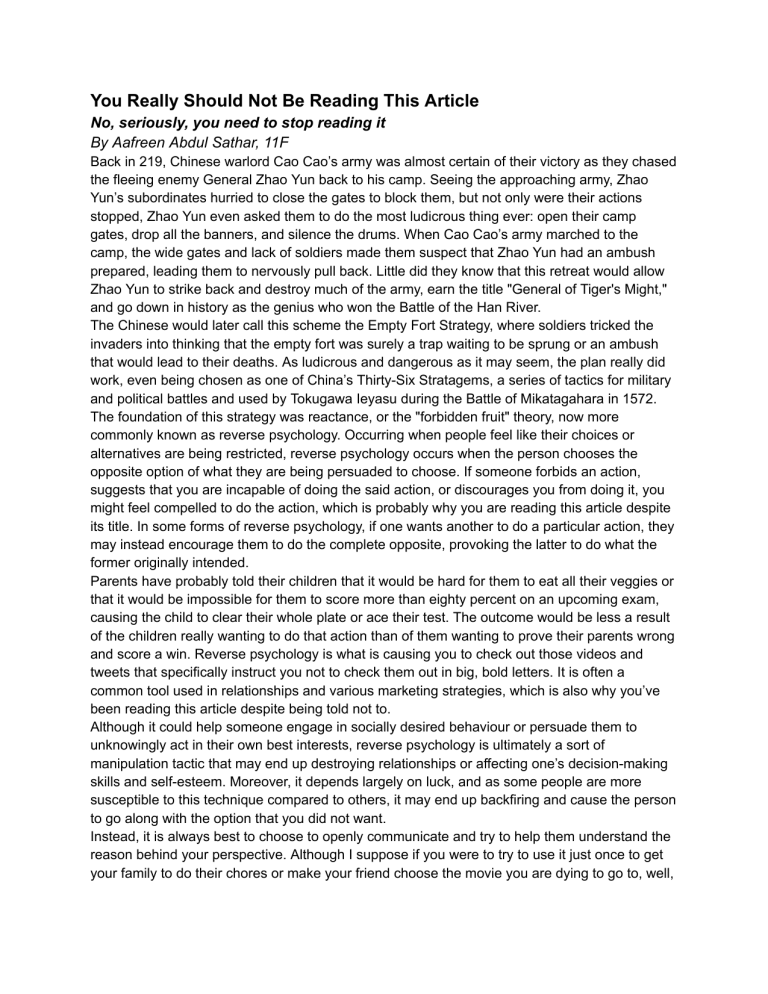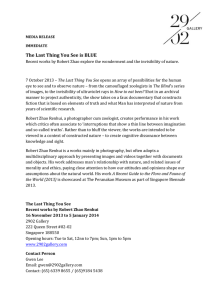
You Really Should Not Be Reading This Article No, seriously, you need to stop reading it By Aafreen Abdul Sathar, 11F Back in 219, Chinese warlord Cao Cao’s army was almost certain of their victory as they chased the fleeing enemy General Zhao Yun back to his camp. Seeing the approaching army, Zhao Yun’s subordinates hurried to close the gates to block them, but not only were their actions stopped, Zhao Yun even asked them to do the most ludicrous thing ever: open their camp gates, drop all the banners, and silence the drums. When Cao Cao’s army marched to the camp, the wide gates and lack of soldiers made them suspect that Zhao Yun had an ambush prepared, leading them to nervously pull back. Little did they know that this retreat would allow Zhao Yun to strike back and destroy much of the army, earn the title "General of Tiger's Might," and go down in history as the genius who won the Battle of the Han River. The Chinese would later call this scheme the Empty Fort Strategy, where soldiers tricked the invaders into thinking that the empty fort was surely a trap waiting to be sprung or an ambush that would lead to their deaths. As ludicrous and dangerous as it may seem, the plan really did work, even being chosen as one of China’s Thirty-Six Stratagems, a series of tactics for military and political battles and used by Tokugawa Ieyasu during the Battle of Mikatagahara in 1572. The foundation of this strategy was reactance, or the "forbidden fruit" theory, now more commonly known as reverse psychology. Occurring when people feel like their choices or alternatives are being restricted, reverse psychology occurs when the person chooses the opposite option of what they are being persuaded to choose. If someone forbids an action, suggests that you are incapable of doing the said action, or discourages you from doing it, you might feel compelled to do the action, which is probably why you are reading this article despite its title. In some forms of reverse psychology, if one wants another to do a particular action, they may instead encourage them to do the complete opposite, provoking the latter to do what the former originally intended. Parents have probably told their children that it would be hard for them to eat all their veggies or that it would be impossible for them to score more than eighty percent on an upcoming exam, causing the child to clear their whole plate or ace their test. The outcome would be less a result of the children really wanting to do that action than of them wanting to prove their parents wrong and score a win. Reverse psychology is what is causing you to check out those videos and tweets that specifically instruct you not to check them out in big, bold letters. It is often a common tool used in relationships and various marketing strategies, which is also why you’ve been reading this article despite being told not to. Although it could help someone engage in socially desired behaviour or persuade them to unknowingly act in their own best interests, reverse psychology is ultimately a sort of manipulation tactic that may end up destroying relationships or affecting one’s decision-making skills and self-esteem. Moreover, it depends largely on luck, and as some people are more susceptible to this technique compared to others, it may end up backfiring and cause the person to go along with the option that you did not want. Instead, it is always best to choose to openly communicate and try to help them understand the reason behind your perspective. Although I suppose if you were to try to use it just once to get your family to do their chores or make your friend choose the movie you are dying to go to, well, then I wouldn’t really be able to blame you for that. It’s like the lesson Christina Geanta’s poem taught: "Say no to hear a yes, turn away to be kissed, hate to be loved, and love to be hated."


